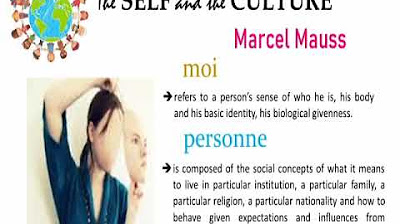Part 1: The Social and Anthropological Perspectives | Understanding the Self | Cebu
Summary
TLDRThe video script explores the concept of self in society and culture. It discusses the philosophical perspectives of body and mind, the roles people play in society, and how these roles define our self-concept. The lecture also covers the 'Ugly Duckling' story from a sociological viewpoint, emphasizing self-discovery and acceptance. It introduces the 'Big Five' personality traits, their biological basis, and how they influence our behavior. The script further delves into social interaction theories by Mead and Cooley, explaining how our self-identity is shaped by societal expectations and interactions. It concludes with the impact of culture on self, using examples like behavior changes in different cultural settings and language nuances.
Takeaways
- 🧠 The script discusses the philosophical concept of the bifurcation between body and mind or soul.
- 📚 Scholars were tired of the dualistic view and sought a new perspective on the self.
- 👩🏫 The speaker identifies themselves as a teacher, student, daughter, and woman, emphasizing the roles we play in society.
- 🌟 The concept of self is shaped by societal roles and cultural definitions.
- 🦆 The 'Ugly Duckling' story is used as a metaphor for self-realization and acceptance.
- 🌊 The 'Big Five' personality traits (OCEAN) are mentioned as having biological underpinnings, influencing how we interact with the world.
- 🌱 Openness to experience is described as a trait that drives curiosity and the desire for new experiences.
- 🔄 Conscientiousness is linked to responsibility and hard work, which are valued traits in employees.
- 🤝 Extroversion is not just about being around people but about gaining energy from social interactions.
- 🤔 Agreeableness and neuroticism are also discussed as key personality traits influencing how we behave and react.
- 🤝 The social self and the authentic self are influenced by societal expectations and cultural norms.
- 🌐 Cultural differences impact how we present ourselves and understand our identity, as shown by the example of behavior changes when abroad.
Q & A
What is the concept of bifurcation discussed in the script?
-The concept of bifurcation refers to the dualistic or divided view of the body and the soul or mind, which is a philosophical perspective that separates the physical from the non-physical aspects of a person.
What does the script suggest about the role of society in shaping our identity?
-The script suggests that our identities are shaped by the roles we play in society, such as being a teacher, student, daughter, etc., and how we interact with others influences our self-concept.
How does the script relate the story of the Ugly Duckling to the concept of self-understanding?
-The script uses the Ugly Duckling story as a metaphor for self-discovery and understanding. Just as the duckling realizes it's a swan, individuals can come to understand their true selves, even if they feel they don't belong in certain societies.
What is the 'Big Five' personality test mentioned in the script, and what does it measure?
-The 'Big Five' personality test, also known as the OCEAN model, measures five broad dimensions of personality: Openness, Conscientiousness, Extroversion, Agreeableness, and Neuroticism. It has biological underpinnings and is used to understand an individual's personality traits.
How does the script define 'Openness' in the context of the Big Five personality traits?
-Openness is defined as the personality trait of seeking new experiences and intellectual pursuits. People high in openness are curious, have many hobbies, and are eager to explore and learn about different cultures.
What is the difference between extroversion and introversion as discussed in the script?
-Extroversion is characterized by seeking fulfillment and energy from social interactions, while introversion involves gaining energy from solitude and may involve a preference for quiet, individual activities. The script clarifies that extroversion does not mean always being around people, but rather getting energy from such interactions.
According to the script, how does the concept of 'agreeableness' affect how individuals behave in society?
-Agreeableness reflects how individuals adjust their behaviors to suit others. It is a personality trait that indicates whether a person is likely to be compassionate, cooperative, and good-natured.
What is the role of social interaction in developing the self, as per the theories of Herbert Mead and Charles Horton Cooley mentioned in the script?
-Social interaction plays a crucial role in developing the self. According to Mead, our concept of self emerges from our interactions with others, and Cooley's 'looking glass self' theory suggests that our self-image is shaped by how we imagine others perceive us.
What are the three phases of developing self-identity according to Cooley's theory mentioned in the script?
-The three phases of developing self-identity according to Cooley are: 1) Imagining how one appears to others, 2) Imagining others' judgments of that appearance, and 3) Developing feelings about the response to those perceived judgments.
How does the script describe the concept of the 'generalized other' in relation to self-concept?
-The 'generalized other' is described as the collective expectations and attitudes that society has towards actions and thoughts within a particular culture. It influences the 'me' (social self) and the 'I' (authentic self), shaping how individuals perceive themselves and behave in society.
What does the script suggest about the influence of culture on the self, using the example of Filipinos abroad?
-The script suggests that culture significantly influences behavior and self-concept. For example, Filipinos may behave differently when abroad due to the cultural context. They might be more obedient to rules in a foreign country because they do not perceive the environment as 'theirs' as they would in their home country.
Outlines

このセクションは有料ユーザー限定です。 アクセスするには、アップグレードをお願いします。
今すぐアップグレードMindmap

このセクションは有料ユーザー限定です。 アクセスするには、アップグレードをお願いします。
今すぐアップグレードKeywords

このセクションは有料ユーザー限定です。 アクセスするには、アップグレードをお願いします。
今すぐアップグレードHighlights

このセクションは有料ユーザー限定です。 アクセスするには、アップグレードをお願いします。
今すぐアップグレードTranscripts

このセクションは有料ユーザー限定です。 アクセスするには、アップグレードをお願いします。
今すぐアップグレード5.0 / 5 (0 votes)






